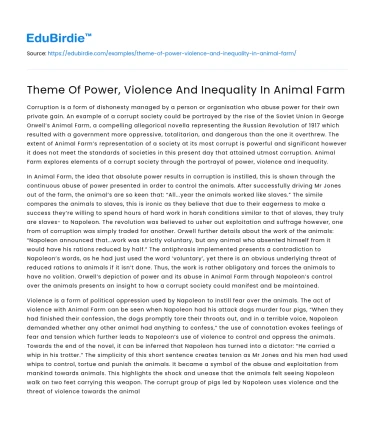Corruption is a form of dishonesty managed by a person or organisation who abuse power for their own private gain. An example of a corrupt society could be portrayed by the rise of the Soviet Union in George Orwell’s Animal Farm, a compelling allegorical novella representing the Russian Revolution of 1917 which resulted with a government more oppressive, totalitarian, and dangerous than the one it overthrew. The extent of Animal Farm’s representation of a society at its most corrupt is powerful and significant however it does not meet the standards of societies in this present day that attained utmost corruption. Animal Farm explores elements of a corrupt society through the portrayal of power, violence and inequality.
In Animal Farm, the idea that absolute power results in corruption is instilled, this is shown through the continuous abuse of power presented in order to control the animals. After successfully driving Mr Jones out of the farm, the animal’s are so keen that: “All...year the animals worked like slaves.” The simile compares the animals to slaves, this is ironic as they believe that due to their eagerness to make a success they’re willing to spend hours of hard work in harsh conditions similar to that of slaves, they truly are slaves- to Napoleon. The revolution was believed to usher out exploitation and suffrage however, one from of corruption was simply traded for another. Orwell further details about the work of the animals: “Napoleon announced that...work was strictly voluntary, but any animal who absented himself from it would have his rations reduced by half.” The antiphrasis implemented presents a contradiction to Napoleon’s words, as he had just used the word ‘voluntary’, yet there is an obvious underlying threat of reduced rations to animals if it isn’t done. Thus, the work is rather obligatory and forces the animals to have no volition. Orwell’s depiction of power and its abuse in Animal Farm through Napoleon’s control over the animals presents an insight to how a corrupt society could manifest and be maintained.
Save your time!
We can take care of your essay
- Proper editing and formatting
- Free revision, title page, and bibliography
- Flexible prices and money-back guarantee
Violence is a form of political oppression used by Napoleon to instill fear over the animals. The act of violence with Animal Farm can be seen when Napoleon had his attack dogs murder four pigs, “When they had finished their confession, the dogs promptly tore their throats out, and in a terrible voice, Napoleon demanded whether any other animal had anything to confess,” the use of connotation evokes feelings of fear and tension which further leads to Napoleon’s use of violence to control and oppress the animals. Towards the end of the novel, it can be inferred that Napoleon has turned into a dictator: “He carried a whip in his trotter.” The simplicity of this short sentence creates tension as Mr Jones and his men had used whips to control, tortue and punish the animals. It became a symbol of the abuse and exploitation from mankind towards animals. This highlights the shock and unease that the animals felt seeing Napoleon walk on two feet carrying this weapon. The corrupt group of pigs led by Napoleon uses violence and the threat of violence towards the animals as a tool of oppression to be in control over the farm.
Orwell further supports the representation of corruption through the employment of inequality towards the animals. When the pigs take control after the rebellion, they move into the farmhouse and sleep in the beds creating inequality between themselves and other animals, this is further shown when Squealer excuses Napoleon’s actions and argues: 'You would not rob us of our repose, would you, comrades? You would not have us too tired to carry out our duties?” Squealer uses personal pronouns to establish a distinct difference between the pigs and other animals. The Farm’s inequality towards certain animals is further explored through the final line of the commandment: 'All animals are equal, but some are more equal than others.' This paradox reveals the truth that beneath the thin facade of equality is blatant political hierarchy, it explores the hypocrisy of governments who claim complete equality and ideals of social justice yet grant power and privilege to a small group of elites. Orwell’s utilisation of inequality blatantly separates the pigs from the rest of the animals, ultimately reinforcing the corruption that Napoleon has established.
The structure and ideas of Animal Farm parallels the Russian Revolution, with the portrayal of corruption through power, violence and inequality. Animal Farm’s representation of the Russian Revolution is a notable and powerful depiction of a corrupt society and although the corruption shown throughout the novella is extreme and radical, Animal Farm’s portrayal of the Russian Revolution could not be as closely compared to some societies in this present day that further define the meaning of a society at its most significant point of corruption.






 Stuck on your essay?
Stuck on your essay?

